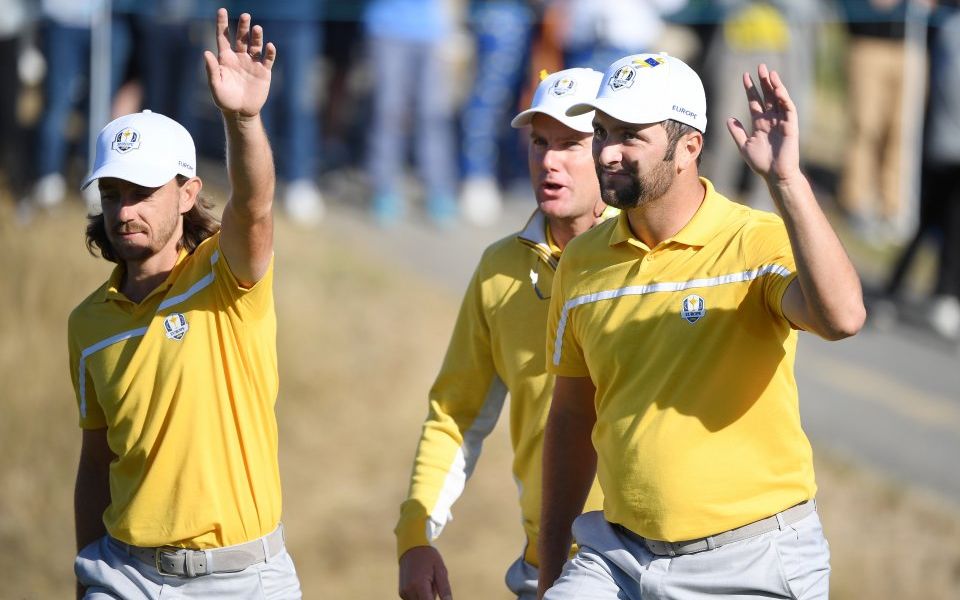The Ryder Cup rookie factor: Does it matter how many debutants are on your team?

If the number of rookies in his team has caused Thomas Bjorn any sleepless nights in the lead-up to Friday's first day of the Ryder Cup then Europe’s captain did his best to hide it earlier this week.
The hosts will have five debutants in their ranks at Le Golf National – Tommy Fleetwood, Tyrrell Hatton, Jon Rahm, Alex Noren and Thorbjorn Olesen. That’s two more than the United States, a factor that contributed to Bjorn naming four experienced campaigners as his wild card picks.
But the Dane said on Tuesday: “The great thing about rookies is that they can’t wait to get out there and get going. I’ve got a good feeling about these five, I have to say.”
Read more: Why the Ryder Cup looks set to become an even bigger deal
The headline numbers indicate that having more rookies than the opposition is a disadvantage.
In the 19 Ryder Cups contested by Europe and the USA since 1979, victories have been harder to come by for the team with the most debutants: only six times have they won, with 12 defeats and one draw.
A further correlation: the USA averages 4.21 rookies to Europe’s 3.73 and has claimed the trophy just eight times to Europe’s 10.

Europe won in 2010 at Celtic Manor despite having more rookies than the USA (Source: Getty)
Both teams have proved equally susceptible to the issue – and equally adept at overcoming it – with three wins apiece when fielding the more callow line-up.
The USA won two of the first three Ryder Cups against Europe with more rookies in their side and again at Valhalla in 2008, when they briefly stemmed the blue and gold tide.
Europe won with more debutants in 1997 at Valderrama, when Bjorn himself made his first appearance, in 2002 at The Belfry under the captaincy of Sam Torrance, and in 2010 at Celtic Manor.
Rookies don't win away
While a greater number of rookies has been a surmountable factor for home teams, that has not been the case when travelling across the Atlantic.
Neither Europe nor the USA has ever hoisted the cup when fielding the greater number of debutants in an away match.
The crucible of the Ryder Cup is all the more fiery with the addition of a baying, hostile crowd – fortunately for Bjorn, spectators in Paris are likely to be right behind his team.
In simple terms, the fewer the rookies the better: both teams have a better strike rate when they have had a low number of newcomers.
Europe are unbeaten in seven matches when they have had three debutants or fewer. Only once in seven previous occasions have they won with five or more novices.
The USA seem less affected: they haven’t lost when they have only fielded one or two Ryder Cup novices, yet they have succeeded with six rookies in the side, as at Valhalla, and even with eight, back in 1979.
Europe require historic feat
For Europe to triumph on Sunday, however, they will need to make history.
They have never won with a rookie differential greater than +1. In other words, they have won when fielding one more rookie than the Americans, but not two – as is the case this week.
The USA, on the other hand, won with a rookie differential of +3 in 1979 and +2 in 2008.
Better omens
The number of newbies is, of course, just one way of measuring the relative pedigree of the two camps – and others make for more encouraging reading for Bjorn.
Europe’s experience deficit is much smaller when looking at the total number of previous Ryder Cup appearances in the two teams: USA boast 34, just four more than the hosts, and 11 of those relate to one player – the evergreen Phil Mickelson.
And when totting up the number of points won at previous matches by the players in each side, Europe come out on top.
Despite having more rookies and fewer appearances, their men have amassed 71½ points to the Americans’ 67. It’s reason enough for Bjorn to rest easy.
